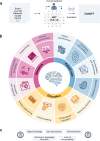The future landscape of large language models in medicine
- PMID: 37816837
- PMCID: PMC10564921
- DOI: 10.1038/s43856-023-00370-1
The future landscape of large language models in medicine
Abstract
Large language models (LLMs) are artificial intelligence (AI) tools specifically trained to process and generate text. LLMs attracted substantial public attention after OpenAI's ChatGPT was made publicly available in November 2022. LLMs can often answer questions, summarize, paraphrase and translate text on a level that is nearly indistinguishable from human capabilities. The possibility to actively interact with models like ChatGPT makes LLMs attractive tools in various fields, including medicine. While these models have the potential to democratize medical knowledge and facilitate access to healthcare, they could equally distribute misinformation and exacerbate scientific misconduct due to a lack of accountability and transparency. In this article, we provide a systematic and comprehensive overview of the potentials and limitations of LLMs in clinical practice, medical research and medical education.
© 2023. Springer Nature Limited.
Conflict of interest statement
The authors declare the following competing interests: J.N.K. declares consulting services for Owkin, France; Panakeia, UK; and DoMore Diagnostics, Norway and has received honoraria for lectures from AstraZeneca, Bayer, Eisai, MSD, BMS, Roche, Pfizer and Fresenius. The other authors declare no competing interests.
Figures

References
-
- Tamkin, A., Brundage, M., Clark, J. & Ganguli, D. Understanding the capabilities, limitations, and societal impact of large language models. Preprint at arXiv10.48550/arXiv.2102.02503 (2021).
-
- Nori, H., King, N., McKinney, S. M., Carignan, D. & Horvitz, E. Capabilities of GPT-4 on medical challenge problems. Preprint at arXiv10.48550/arXiv.2303.13375 (2023).
Publication types
LinkOut - more resources
Full Text Sources

